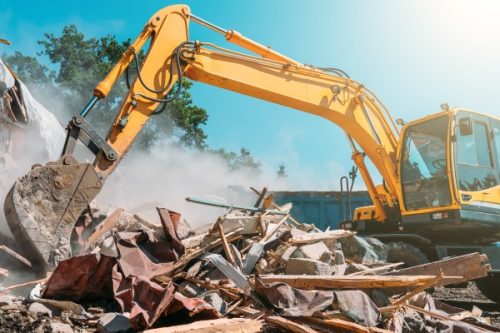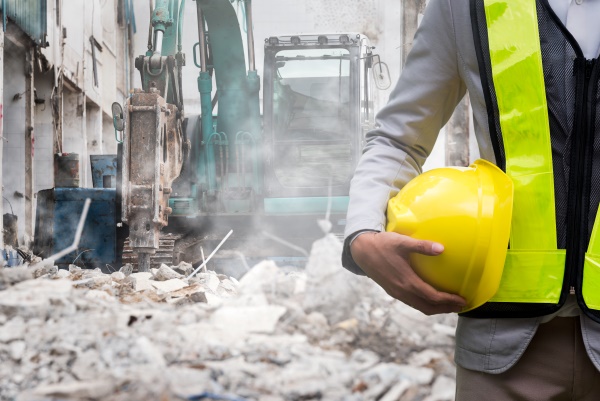
The demolition industry plays a crucial role in urban development, but it is fraught with significant risks. From accidental damage to nearby structures to the dangers posed by falling debris and environmental hazards, demolition projects are inherently perilous. These risks not only threaten the safety of workers and the public but also pose substantial financial and legal challenges for contractors. Demolition insurance emerges as a vital safety net, providing essential protection against these unpredictable dangers. For demolition contractors, understanding the specific risks they face and securing appropriate insurance coverage is not just prudent—it’s essential for safeguarding their business and reputation.
Understanding the Unique Risks in Demolition
Accidental Damage to Surrounding Buildings
Demolition projects often take place in close proximity to existing structures, increasing the risk of accidental damage. For example, vibrations from demolition equipment or unexpected collapses can lead to cracks, structural weakening, or even the collapse of nearby buildings. Such incidents not only cause physical damage but also lead to significant financial and legal consequences for the demolition contractor. Property owners may file claims for damages, resulting in costly legal battles and compensation payments. This makes it essential for contractors to have adequate insurance coverage to mitigate the financial burden and protect against the potential fallout of such incidents.
Injuries from Falling Debris
The demolition process involves numerous safety hazards, with falling debris being one of the most significant risks. Workers are constantly exposed to dangers from collapsing structures, flying materials, and heavy machinery. These hazards can lead to serious injuries or fatalities, making safety a top priority on demolition sites. Contractors are responsible for ensuring that all necessary precautions are taken to protect their workers, including proper training, safety gear, and adherence to regulations. However, accidents can still occur, making insurance coverage crucial. Workers’ compensation and general liability insurance provide financial protection and ensure that injured workers receive the necessary support.
Environmental Hazards
Demolition projects can have a profound environmental impact, particularly when dealing with hazardous materials like asbestos, lead, and dust. The improper handling or release of these materials can lead to contamination, posing health risks to the public and significant environmental damage. In the UK, strict regulations govern the management and mitigation of these risks, requiring contractors to follow specific procedures for handling hazardous materials. Failure to comply can result in hefty fines and legal liabilities. Pollution liability insurance plays a vital role in covering the costs associated with environmental clean-up, legal defence, and third-party claims, ensuring contractors are protected against these complex risks.
Types of Insurance Policies for Demolition Contractors
General Liability Insurance
General liability insurance is a cornerstone of risk management for demolition contractors. This coverage protects against third-party claims arising from bodily injury or property damage caused during demolition activities. For instance, if debris from a demolition site damages a neighbouring building or injures a bystander, general liability insurance would cover the associated costs. However, this type of insurance has its limitations. It may not cover incidents arising from professional errors or environmental damage, leaving gaps that contractors must address through additional policies. Therefore, while general liability insurance is essential, it should be part of a broader insurance strategy.
Professional Liability Insurance
Professional liability insurance, also known as errors and omissions insurance, is crucial for covering the risks associated with planning and executing a demolition project. Unlike general liability insurance, which covers physical damage and injuries, professional liability insurance protects contractors from claims related to mistakes, negligence, or failure to deliver services as promised. For example, if a contractor misjudges the structural integrity of a building and the demolition causes unexpected damage, this policy would cover the resulting legal and financial consequences. The key difference between general and professional liability coverage lies in the nature of the risks they address—physical versus professional.
Pollution Liability Insurance
Pollution liability insurance is increasingly vital for demolition contractors, particularly given the stringent environmental regulations in the UK. Demolition often involves the handling of hazardous materials like asbestos, lead, and contaminated soil, which can pose serious environmental and health risks. Pollution liability insurance covers the costs associated with environmental clean-up, legal defence, and third-party claims resulting from the release of pollutants. As regulatory oversight becomes more rigorous, the importance of this insurance grows. Without it, contractors could face crippling financial liabilities, especially in cases involving large-scale contamination or breaches of environmental law.
Workers’ Compensation Insurance
Workers’ compensation insurance is a legal requirement in the UK, designed to protect both employees and employers in the event of work-related injuries or fatalities. Given the high-risk nature of demolition work, this insurance is particularly important. It covers medical expenses, rehabilitation costs, and lost wages for injured workers, ensuring they receive necessary care without placing a financial burden on the employer. Additionally, workers’ compensation insurance shields employers from lawsuits related to workplace injuries, providing a vital layer of protection. For demolition contractors, maintaining adequate workers’ compensation coverage is not only a legal obligation but also a critical component of their risk management strategy.
How Demolition Insurance Mitigates Risks
Financial Protection
Demolition insurance provides critical financial protection by shielding contractors from the potentially ruinous costs of claims. For example, consider a scenario where debris from a demolition site damages a neighbouring building, leading to a claim for repairs. Without proper insurance, the contractor could face substantial out-of-pocket expenses, which could cripple their business. In another case, if a worker is injured on-site and the contractor lacks adequate workers’ compensation coverage, the financial burden of medical bills and legal fees could be overwhelming. By securing comprehensive insurance, contractors ensure that these unexpected costs are covered, safeguarding their financial stability and business continuity.
Legal Safeguards
Comprehensive demolition insurance also serves as a crucial legal safeguard, helping contractors avoid costly lawsuits and prolonged legal battles. In an industry where accidents and incidents are common, having the right insurance ensures that contractors meet their contractual obligations and adhere to regulatory requirements. For instance, pollution liability insurance can prevent legal disputes over environmental damage, while professional liability insurance protects against claims of negligence or errors in project execution. By covering these risks, insurance helps contractors navigate the complex legal landscape of the demolition industry, allowing them to focus on their work without the constant fear of litigation.
Reputation Management
In the competitive demolition industry, a contractor’s reputation is invaluable. Accidents, property damage, or environmental breaches can quickly tarnish a company’s image, leading to a loss of clients and business opportunities. However, having the right insurance coverage not only mitigates the financial and legal fallout of such incidents but also demonstrates a contractor’s commitment to safety and responsibility. Clients are more likely to trust and hire contractors who have comprehensive insurance, as it signals reliability and professionalism. In this way, insurance plays a vital role in maintaining and even enhancing a contractor’s reputation, which is essential for long-term success.
Demolition contractors face numerous critical risks, from accidental damage to surrounding buildings and worker injuries to environmental hazards. These risks can lead to severe financial, legal, and reputational consequences if not properly managed. Securing comprehensive insurance coverage is essential for mitigating these risks and protecting the business from unforeseen events. Proper insurance not only shields contractors from costly claims and legal battles but also demonstrates a commitment to safety and responsibility. In the long run, investing in the right insurance policies is a key factor in ensuring the stability, growth, and success of a demolition business.

